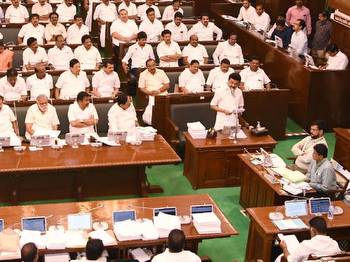Online Gaming Bill 2022

The newly introduced gaming Bill, introduced in the Lok Sabha on 1st April 2022, correctly points out that India has around 420 million active online gamers with a valuation. of $1 Billion and the industry is stated to grow to $5 Billion by 2025. Given the exponential growth of the gaming industry and the lack of regulatory regime to control the same, the entire industry has been stricken with uncertainty and is at the mercy of operative parlance. The proposed bill states that it seeks to create a robust regulatory framework that will oversee the functioning of online gaming websites and curb illegal online gaming.
Current Regime:
Currently, in India, vide Entry 34, List II, The Constitution of India empowers the state to legislate on ‘betting and gambling’. Gambling being a game of chance is banned or heavily regulated in most States in India. When it comes to online money-based gaming, over the years the judiciary has attempted to differentiate between a game of skill and game of chance, with online games of chance being construed as gambling. However, such differentiation needs to be made on a case to case basis making it highly time-consuming. Additionally, every state maintains its own legislature over the online gaming industry. Owing to this, the same gaming operator is required to adhere to varied regulations across the country, this has become a significant hurdle for parties in the online gaming industry.
Hence, while the gaming industry is growing and generating significant revenue across populations and income groups, it is still ripe with controversy and lacks regulatory clarity. Hence, a unified central law is the need of the hour.
Does the Centre actually have the power to bring out a new law?
The proposed bill seeks to regulate all sorts of online gaming regardless of whether it's a game of skill or game of chance, and regardless of whether it is money-based or not. While there is no restriction on the Central Government for formulating laws and regulations regarding online gaming, gambling squarely falls in the state list.
Proposed Regime:
Name of the Bill: The Online Gaming (Regulation) Bill, 2022
Objective of the Bill: to establish an effective regime to regulate the Online Gaming industry, to prevent fraud and misuse, and for matters connected therewith or incidental thereto. Online gaming is defined as any online games played on electronic devices such as smartphones, personal computers, tablets, laptops etc.
Salient Highlights:
1. To set up an Online Gaming Commission (OGC) consisting of experts from the fields of cyber-technology, law and legal enforcement. This commission will have the power to regulate all aspects of Online Gaming, from coming out with rules and regulations for gaming, to granting and revoking licence etc.
2. Imprisonment provisions to be introduced for the breach of conditions of the licence provided.
3. Wide rule making power to the OGC
4. Allowing for Foreign Direct Investments (including but not restricted to technological collaboration) in the field of Online Gaming.
5. To override any and all legislations inconsistent with the proposed Bill (once it becomes an Act).
6. To periodically send special reports on matters pertaining to Online Gmaings to the Central Government.
The proposed Bill seeks to created a unified law for an industry that currently has a myriad of laws, many contradictory, and hence is a step in the right direction.However, even so, the bill leaves a lot to be covered; for instance there is no distinction made between skill-based and chance-based gaming, and increased bureaucracy in the absence of crystal-clear mechanisms for licence approvals, data protection, and grievance mechanisms to say the least. Additionally it does not elaborate on how it would impact the existing laws and regulations on the matter;the ambiguity in the bill only goes on to create confusion between state and central laws, consequently making the regulatory regime complicated.
Note: In addition to this Bill, the GoM is discussing a GST tax slab of 28% for Online games. The current regime taxes online games at 18% GST.
On another note, Rajasthan has also recently introduced a Rajasthan Virtual Online Sports (Regulation) Bill 2022 for stakeholders comments. This Bill intends to regulate online fantasy sports and different formats of virtual online sports (VOS). While the centre has its own legislation in the pipeline, a state bill for stakeholders comments running parallely results into a regulatory fiasco for the gaming industry.
Authored by: Garima Mitra, Co-Founder, Treelife Consulting
Dear Reader,
Business Standard has always strived hard to provide up-to-date information and commentary on developments that are of interest to you and have wider political and economic implications for the country and the world. Your encouragement and constant feedback on how to improve our offering have only made our resolve and commitment to these ideals stronger. Even during these difficult times arising out of Covid-19, we continue to remain committed to keeping you informed and updated with credible news, authoritative views and incisive commentary on topical issues of relevance.
We, however, have a request.
As we battle the economic impact of the pandemic, we need your support even more, so that we can continue to offer you more quality content. Our subscription model has seen an encouraging response from many of you, who have subscribed to our online content. More subscription to our online content can only help us achieve the goals of offering you even better and more relevant content. We believe in free, fair and credible journalism. Your support through more subscriptions can help us practise the journalism to which we are committed.
Support quality journalism and .

































